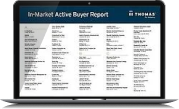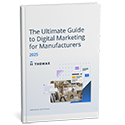6 Ways Manufacturers Can Transform Their Sales Organization
Team Thomas March 11, 2021
The B2C space has adapted quickly to using technologies and tools to connect with more customers, and B2B businesses (including industrial companies) making a move too. We've pulled together some tips to incorporate tactics that fall under the sales transformation journey (and tied to inbound marketing) to help you become more competitive in the current market and have meaningful conversations with high-quality leads.
1. Understand That The Buyer Is In Control Of The Sales Process
Because B2B buyers are driving the sales process in all industries and are using digital content to make their purchasing decisions, they are more than 70% of the way through the decision-making process before ever contacting a sales representative. Thus, smart manufacturers and suppliers are shifting to digital and data-driven approaches to drive growth and retain customers. If you only focus on what happens in the 30%, you'll miss out on the opportunities to fill your pipeline faster with quality sales leads.
Assess your prospect’s needs and be better equipped to meet them by asking your current customers about their strengths and weaknesses, challenges they’re facing with current suppliers, ideal time-to-market, etc. This will give you a better idea of the type of content you can provide to prospects online browsing your website. Identifying needs that you can help solve demonstrates that you have the prospect’s best interest in mind not just for their project in need, but for the long-term, which builds a trusting relationship that will continue to grow over time.
Learn More: How To Meet The Needs Of B2B Buyers
Industrial buyers that have changed the marketing and sales paradigm easily sniff out – and tune out – businesses that aren’t aligned with the way they buy. Industrial marketing and sales today require having people with experience and a detailed understanding of digital best practices and technology.
2. Organize Your Relationships In A CRM
We’ve expounded on the importance of a good customer relationship management (CRM) before, but we think it’s worth mentioning again — especially since research conducted by Vantage Point Performance and the Sales Management Association revealed 44% of executives believe their company is ineffective at managing their sales pipeline.
Having a CRM in place can change that statistic by allowing sales reps to better manage their time and become more efficient, in addition to:
- Keeping you (and your team) organized
- Giving you a clear picture of your pipeline in real-time
- Getting hours back in the day with automation
- Providing full transparency between your sales and marketing teams
Imagine having a great conversation with a sales professional, and then having one of his or her colleagues contact you to set up the same exact meeting you just had. It probably wouldn’t leave a great impression. You can stop this from happening by implementing a CRM because it provides a high-level view of the lifecycle of a visitor-turned-opportunity, which helps you manage your pipeline more effectively.
Most CRMs are built for sales managers to keep track of their team members, but HubSpot was built from the ground up to help each salesperson and marketer sell more (which is a huge selling feature — pun intended). For the sales rep, there are fail safes to prevent prospects from falling through the cracks, and for the sales manager, there’s a strong reporting toolset to help their teams accelerate.
Read More: The Manufacturing Leader's Step By Step Guide To Converting Website Traffic To Leads
3. Set Up Lead Scoring
Not all leads are created equal. Lead scoring your MQLs and SQLs using a CRM is important because the higher the score of a lead, the higher priority they should be on your call list.
People generally like to have some knowledge of a subject before they have a conversation about it, so it’s important to let prospects learn at their own pace and then develop a relationship more organically from there. This is all part of the awareness stage of the buyer’s journey, and the more consideration you’re seeing (as the prospect browses your website, downloads your offers, completes form submissions, etc.), the higher their lead score will be.
Say, for example, you’re a raw materials distributor. One of your potential customers does a Google search for "metal standards," finds your website and downloads your eBook on the topic. A sales call at this point is likely premature because they’re in an exploratory/education phase and not ready to be sold to. If instead you offered other types of helpful content, you’d stay top of mind (while building up history and a relationship) until they’re ready to buy. Aim to become a trusted advocate and adviser, rather than just another salesperson.
Learn More: The Basics Of Content Marketing To Engage B2B Buyers
For sales teams that are fielding a high volume of leads on a regular basis, using a scoring system can help prioritize a salesperson’s lead list by who’s most likely to be ready to buy. Typical qualifiers include job title, company size, and industry. A senior procurement manager at a large company in your sector may be a warmer lead than an intern at a mom-and-pop shop in another sector you don’t typically serve. A CRM like HubSpot lets you see valuable insight into leads and the leads’ motivations helping you make better business and sales decisions.
You’ll also want to factor in how active the visitors are on your website — somebody who has downloaded multiple assets and regularly returns to your website is a warmer lead than someone who hasn’t. Thomas WebTrax is a marketing tool you can use in tandem with your other sales tools to identify the leads and sales opportunities that provide the best growth path for your business. It offers demographic and firmographic filters to specify criteria such as industry, geography, company size, revenue range, and company name.

More than 11,000 manufacturing companies use Thomas WebTrax to provide them with insight into the activity of B2B buyers throughout the entire buying journey — not just after they fill out a form or contact you.
4. Take Advantage Of Automation And Email Templates
When you’re ready to reach out to a prospect, keep this in mind: Time is a resource we can’t get back. There are a few ways to make your process more efficient, and using sales ready-to-edit email templates can help you save time from each email you send, which can easily add up to hours per week.
You can create your own templates using just about any email provider — although we definitely recommend HubSpot to easily customize email options and then save them as drafts. HubSpot has CRM and marketing automation capabilities to automate emails, schedule social media posts, and more. The software uses triggers that automatically enroll website visitors in new nurture paths that can help guide them in their research and sourcing process — and lets you see what they're most engaged on.
When you can tell you what pages your prospects have visited, how long they were on those pages, and how many of your emails they have opened, your sales team is in a better position to sell.
Learn More: 10 Types Of Email Marketing You Should Be Sending
5. Align Your Sales And Marketing
Sales folks always complain about the quality and quantity of leads whereas marketing whines about sales not closing their leads — you don’t want to perpetuate the cycle, do you?
Marketing and sales teams often seem at odds with each other, but really, our goals are pretty much the same — we all want to grow our business and you can't have one team without the other. It’s important to increase transparency on both sides of the aisle.
Take a look at your past numbers and where they’ve led you. What percentage of leads resulted in closing? Do different types of leads close at different rates? And based on that information, how many leads overall will you need to meet your revenue goals? Using your CRM and marketing automation platform's reporting capabilities, run the numbers, and figure out how many leads your marketing team needs to bring to the table in order for the sales team to close the number of deals necessary to hit your goals for the year. An integrated workforce where all teams (including finance and your factory workers, too) understand how they work together helps the business function smoothly internally and from a revenue standpoint.
More Insight: Top 3 Pitfalls For Industrial Sellers (And How To Solve Them)
6. Don’t Be Afraid To Say No
Not every lead is going to be a good fit for every product or service. Fear of rejection is a huge weakness in sales; you need to be able to move on and look for opportunities that are a better fit. If you can’t do this, you’ll waste time on someone who’s likely never going to buy from you instead of spending your time on more viable opportunities. Know when to accept “no.”
Alternatively, there may be prospects who want to work with you, but want more than you can deliver or have other unrealistic expectations. In this case, you can try to find some kind of compromise that works for everyone, but if they’re resolute and won’t budge, it might be best to walk away. Even if there is a remote possibility that you can do the job despite their tight budget and timeline — is it worth stressing your own team and resources?
We all dream of high close rates, organized process, and seamless coordination between marketing and sales — but they're not one-and-done tasks. Expanding your business into new markets and strengthening your place in the industry begins with a digital transformation. Taking stock of how your organization operates and pushing for better collaboration between your teams will make your company more competitive.
Take The Next Step To Improve Your Sales
With 45% of manufacturers investing in digital advertising to continue reaching new customers, Thomas can help take your company's lead generation and sales to the next level too. Our team has been connecting B2B buyers and suppliers for more than 122 years.
Unlike traffic generated by search engines, email sponsorships, and other channels, all of the sourcing activity on Thomasnet.com is driven by real, verified, and active buyers — not accidental traffic, bots, or unqualified traffic. Contact us to learn how you can get in front of qualified buyers and increase your bottom line. Thomas provides lead generation services that fit any size budget.
Or request these additional free lead generation tools for manufacturers and industrial companies:
- A free active in-market buyer report to see the company names who are searching for your products and services right now
- Curious to see how your current online presence compares with competitors? Request a free online analysis of your website here
- Begin improving your sales with a free company profile on Thomasnet.com where more than 1.2 million B2B buyers, procurement professionals and engineers source industrial products and services.
Tiodize is a manufacturer of dry film lubricants, degreasers and grease. Here's their experience with advertising their business on Thomasnet.com:
"We started our internet marketing with Thomasnet.com at the suggestion of our largest customer, Boeing. They assured me that Thomasnet.com was where their engineers went first to find information on suppliers.
We are a very conservative company. Our sales have gone up exponentially compared to our increases in our ad budget. Because we manufacture and sell specialty coatings and composites, we are always looking for ways to be in front of decision makers when they need our products. Thomasnet.com is an efficient and effective way for us to do that. We have added customers every year and increased our sale per customer at the same time.
Thomasnet.com is perfect for companies that do not have national sales forces. "
If you’re overwhelmed with the idea of tackling these sales transformation changes alone or need some more advice on where to begin, we're here to partner with you. Degreed engineers support our industrial marketers to offer insight into how you can better reach your sales goals. Contact us for a free digital health check.
“As a small machine shop, it’s critical that every marketing dollar I spend attracts the right kind of customers — those that I actually want to do business with," said Richard Barnard, President, Eaglestone Technology, Inc. "My Thomasnet.com program paid for itself within the first three months.”
Additional Sales-Related Resources For Manufacturers:
- 6 Ways To Turn A Lead Into A Customer
- How To Get People To Read Your Sales Emails
- How To Build Effective Email Prospect Lists
Did you find this useful?












